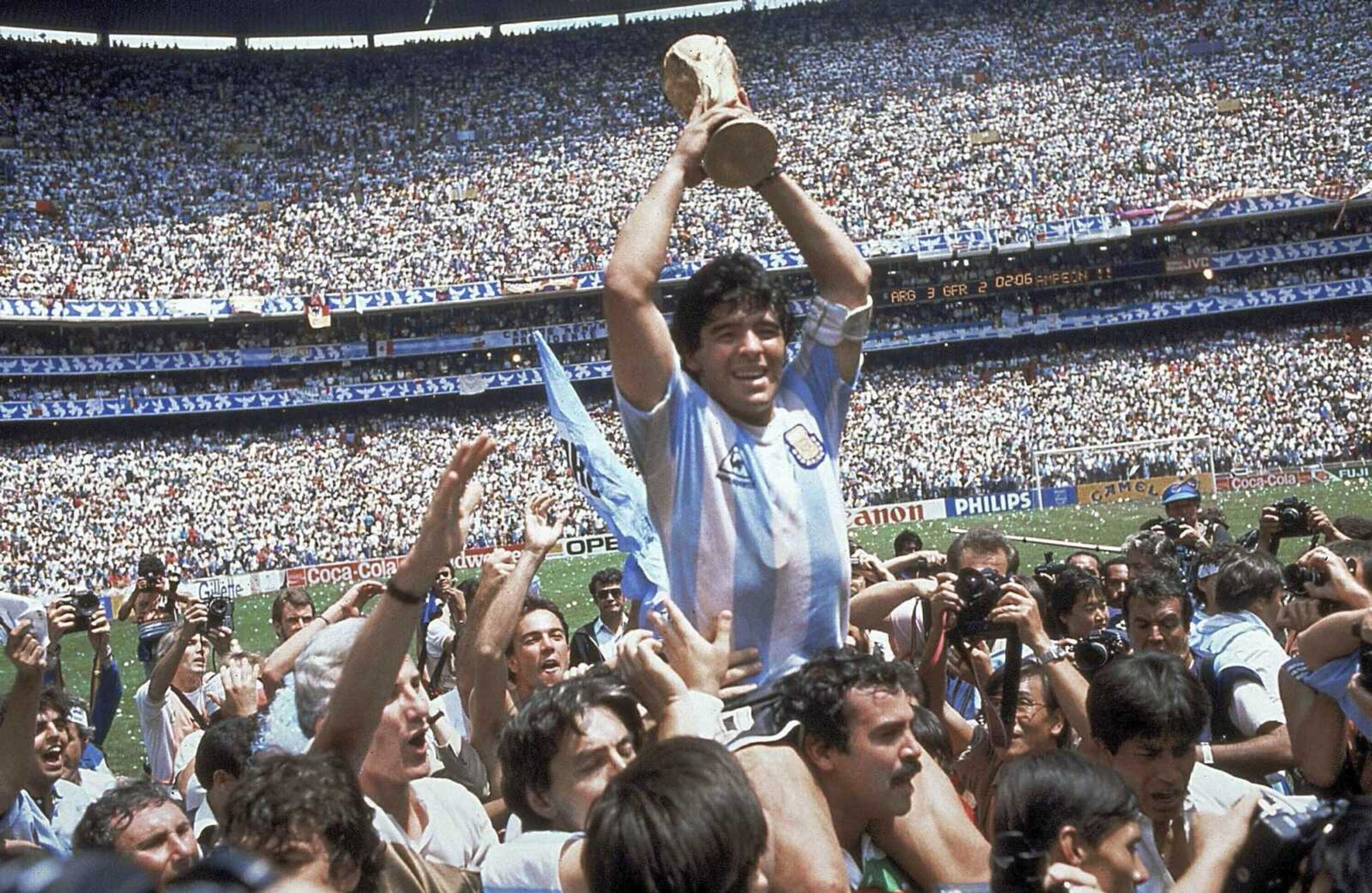The day I watched Diego Maradona play
If you love soccer, you know Diego Maradona as one of the all-time greats. The day I watched him play was June 8, 1990, in Milan, Italy, the opening match of the once-every-four-years World Cup, with Argentina defending its crown. When that day started, I had no idea I would be there, or how important the day would become to international soccer.
If you love soccer, you know Diego Maradona as one of the all-time greats. Named one of two players — along with Pele — as the best of the century by FIFA, the governing body for international soccer, he led his native Argentina to the World Cup in 1986 with a virtuoso performance that featured what may be the prettiest goal of all time and one of the most devilish, both in the same game. When asked whether he used his fist — unseen by refs — to direct the ball into his opponent’s net during a tight quarterfinal match against England, he responded that it was “a little with the head of Maradona and a little with the hand of God.” Minutes later, he maneuvered single-handedly through most of the English team to score what many believe to be the greatest World Cup goal of all-time. Much of his life was along the same pattern: brilliant soccer paired with wit and controversy.
But, wow, was he thrilling to watch. Only 5 feet, 5 inches tall, he electrified stadiums with his skills and cunning, and was described by one commentator as a “comet from the sky.”
The day I watched him play was June 8, 1990, in Milan, Italy, the opening match of the once-every-four-years World Cup, with Argentina defending its crown. When that day started, I had no idea I would be there, or how important the day would become to international soccer.
I was a college student working in Russia at the time, using a two-week break between obligations to travel in Western Europe by Eurail Pass. To save money, I chose a few destinations with no plan other than that the stops were far enough apart to allow me to sleep overnight on board rather than chancing a hostel, which is how I found myself on the way to Milan the eve of the World Cup.
Little did I sleep that night, however, because there were hundreds of Irish soccer fans on the same train. Violent rivals Ireland and England were scheduled to play their first game against each other (on the island of Sardinia, where authorities hoped to quell any hooliganism), and fans from both teams had been placed on different trains but on the same route, overlapping for a few minutes at each station. During the overlaps, drunken passengers would break into cheering and soccer songs, fans from each side vying to be the loudest.
Arriving in Milan, I hurried to the main hostel, grabbed a bed and locker, took a short nap, then woke wondering out loud why no one was around. The hostel keeper looked at me incredulously, pointed to the TV, and said the World Cup was about to begin — right there in Milan.
I quickly departed for the Stadio San Siro, curious about what I would see, but found only emptiness. The entire area around the stadium was deserted, though I could hear the festive sounds from inside (where I later learned Italian models in classy and yet sparse dress and actress Sophia Loren were leading the opening ceremonies with a healthy contingent of the Italian Army).
A single man was in view and he walked up to me, a ticket in hand. I looked at him suspiciously, said I only had the equivalent of $15 in my wallet (which was true, though I had more strapped beneath my clothes), and after some haggling he sold it to me. The clincher, he said in broken English, was that more people had come for the opening ceremony than the game (which pitted the world’s best team and player against Cameroon, a team from Africa considered by most observers — and some of its own players — a joke). I was, in effect, the last person outside the stadium whom he could get money from.
I approached the gate, held out the ticket and prepared to walk in. But the attendant stopped me, looked at my ticket, looked at me, looked at my ticket, said something in Italian, and laughed. Finally, he motioned me forward.
This strange — and somehow mirth-causing — episode repeated itself several more times as I wandered around the stadium with attendants looking at me and my ticket and laughing, before passing me on to the next gate. As the play on the field raged and African drums started to beat, an attendant motioned to the opposite end of the stadium and I walked there, heading toward the upper rows only to be met by another attendant, who pointed below to a spot behind and just above one of the goals.
And so, finally, I found my seat, in the middle of a sea of green-clad Italian soldiers, the only civilian among them. And I laughed, too, with happy amazement that I had been allowed in with a soldier’s pass.
But all attention was now on the game, which was brutal.
Maradona was hounded by the persistent African team, rarely given room to maneuver, with cheers from everyone in the stadium — except those from Argentina — every time he was tackled. Maradona, you see, had just recently led his soccer club to a championship over Milan, and the fans there were against him. Moreover, Argentina was a favorite in the tournament and thus a threat to Italy’s hopes, and Cameroon, representing a continent that had mainly embarrassed itself up until then in international play, was the ultimate underdog.
Maradona was tackled again and again, and each time it was like sparks emanated from his head. A red card was issued to Cameroon, causing it to play 10 against 11. And, then: a miracle, in the net right before me, a header by Cameroon for a goal. The crowd went crazy, African drums beating to a crescendo. From there the game became even more intense, the drums seemingly coming from everywhere. Here is how the Guardian newspaper described it:
“In the space of 90 minutes African football, once derided for being all about juju magic and Zairian defenders with a limited grasp of free-kick regulations, became credible. The result was celebrated not only in Cameroon, where impromptu street parties erupted across the nation … but across Africa and beyond.
“‘No one thought we could do anything here against Maradona, but we knew what we could do,’ the goalscorer, François Omam-Biyik, said after the game. ‘We hate it when European reporters ask us if we eat monkeys and have a witch doctor. We are real football players and we proved this tonight.’”
The Guardian continued: “The match is best remembered for the moment, two minutes from the end, when Claudio Caniggia, Argentina’s flaxen-haired substitute striker, went on a run down the right. Italia 90 was something of a festival of simulation during which neither Caniggia nor any other Argentinian was to become known for their refusal to go to ground under any kind of challenge, but with his side trailing and time running out he stayed up when an imprecise tackle came flying in, kept going despite a second attempt to bring him down, and was promptly taken out in the most emphatic style by Benjamin Massing, an assault that sent the tackler’s right boot, and possibly a few body parts, flying across the pitch, and earned Cameroon their second red card of the day.”
The remainder of the game was played 9 against 11.
“Argentina could not believe it, the crowd could not believe it, the world television audience probably did not believe it and even now it seems like something out of a fantasy. It is one thing to beat Argentina with a full side but to finish on the attack with nine men is rather rubbing it in.”
Afterward, Maradona told the Guardian, “I don’t think they had any intentions of beating us up to win the game. I cannot argue, and I cannot make excuses. If Cameroon won, it was because they were the best side.”
I left the stadium caught up in the euphoria and joined thousands who converged on the Piazza del Duomo to dance with Cameroon into the night. Cameroon would go on to make the quarterfinals, displaying triumphant talent, and causing FIFA to expand the number of World Cup teams from Africa in the future. Maradona and Argentina recovered to escape group play and make it to the final, where they lost their bid to repeat as world champions 1-0 on a penalty kick. Subsequently, a plan to deploy more yellow cards to safeguard and emphasize the “beautiful game” was enacted. And I returned to Russia, dusting off my skills from high school soccer, to compete with and against villagers in the places I worked and traveled.
All this because of the day I watched Maradona play.
Last week, on Nov. 25, at age 60, after a life of extremes, Diego Maradona died of a heart attack. He was one of the greatest soccer players of all time.
Jon K. Rust is publisher of the Southeast Missourian.
Connect with the Southeast Missourian Newsroom:
For corrections to this story or other insights for the editor, click here. To submit a letter to the editor, click here. To learn about the Southeast Missourian’s AI Policy, click here.











